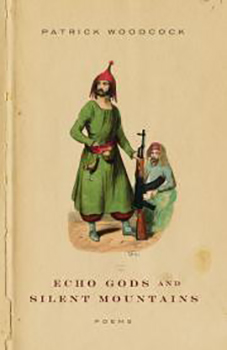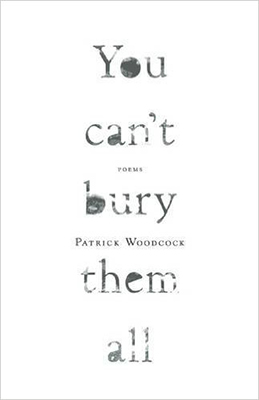 Patrick Woodcock uses poetry to document the suffering of humanity in war-torn countries?a kind of poetic nonfiction. (See Voice review of Echo Gods and Silent Mountains: Poems, his book of poems based on his time in Iraqi Kurdistan.) Recently he took the time to answer Wanda Waterman’s questions about his formal and informal education and some of the close calls he experienced in Iraq. (Also read the first and second parts of this interview.)
Patrick Woodcock uses poetry to document the suffering of humanity in war-torn countries?a kind of poetic nonfiction. (See Voice review of Echo Gods and Silent Mountains: Poems, his book of poems based on his time in Iraqi Kurdistan.) Recently he took the time to answer Wanda Waterman’s questions about his formal and informal education and some of the close calls he experienced in Iraq. (Also read the first and second parts of this interview.)
Unwitting Mentors
As with many poets, university wasn’t a great fit for Patrick, who openly admits to having despised it. But he later realised that all of his learning, even his formal education, had been a huge boon to him, preparing him for the nomadic life he now follows.
?It was nothing like I expected, and I was too immature and too far-gone in many respects to be there. I’m still amazed I graduated. It wasn’t until I moved to Poland that I understood how much university had helped me. And since then I have taken every possible chance to continue studying.
?Over the years I had only one prof who really affected me. My first year of university was at Concordia in Montreal. Being the genius that I am, I arrived late and, when I signed up for my courses, paid little attention to what years they were for. So some of my courses were for second and third year students. I don’t remember the name of the prof, but I do remember that for about three weeks I couldn’t figure out if he was blind or not; he had this odd way of squinting that both confused and intrigued me.
?The first book we read was Nietzsche’s The Theatre of Tragedy, which, intellectually, was quite a slap in the face. But I found the prof so interesting that I decided to stay in his class even if I failed. He would go off on tangents about everything from opera to architecture, from wine to different breeds of horses, and he made it all sound so effortless and natural.
?I really wanted to be like him? to be that interesting. It was a full year course with only two exams, each worth 50%. My proudest moment in all my years at university was passing that course ? barely passing.
Patrick cites one inciting incident that had a major impact on his development as a writer: “I was walking around Montreal alone one night (1988) and saw a small sign at the entrance to Concordia’s main building?that ugly colossus. It was to promote a reading by a Canadian ’avant-garde’ poet. It was the first reading I had ever attended. A few hours later I was sitting in a small room with about eight people and Christopher Dewdney.
?He was promoting Immaculate Perception and a chapbook about a man who parachuted into a group of clouds and was stuck in them for hours?I hope I remembered that correctly?the reading was brilliant. It was absurd, amusing, ambitious without being pretentious, challenging, and by far the most entertaining and inspiring presentation I’ve ever seen. And to think it was just Dewdney sitting at a table telling us stories, nothing else. I’ve been addicted to his work ever since and continue to reference the structure of that evening whenever I have to give readings now.
Spiritual Explorations and Close Calls
?After I stopped teaching at the private school I mentioned earlier, I moved to Zakho and began to lecture at their university. One of my colleagues?now a close friend?was Yezidi [a largely Kurdish ethno-religious group whose religion is influenced by Sufism and has ties to Zoroastrianism]. I began to study his faith and found it fascinating. Whenever I would return to Duhok I would have lunch at the Dilshad Palace Hotel because it was the only air-conditioned venue I liked in the city.
?After a few weeks I became friends with the maitre d? and learned that he was not only Yezidi but also one of their?for lack of a better word?elders. He helped arrange for me to travel to Lalish, which is their spiritual home and also to meet their prince three times. After getting to know and trust each other over a couple of months, he invited me to visit his village and meet his family. He told me what time to be ready at the university and that he would send a cab for me. So, I rose early, got prepared, and set off in the cab.
?But a couple of problems arose almost immediately. The driver spoke no English and I had no idea where the village was. As we were driving I wasn’t too happy to realise we were heading towards Mosul. I have to explain that when I was in Iraq, entering Mosul was a death sentence for foreigners, as well as for some locals (a few of my students limped as a result of being randomly shot by a sniper when returning home from visiting family members.)
?The kidnappers in Mosul had given up on the idea of returning the kidnapped victim alive since some governments had attempted to rescue the hostage. So they adopted a policy of killing the kidnapped individual and sending a photo of the dead body to the person’s family or government. The ransom asked for was not for the person’s safe return but for the corpse so it could be buried at home.
?All of this was going through my head as we approached Mosul. I realised that I had no idea where I was going, did not know the driver, and I also began to wonder if I had entered the wrong cab. I could see that there were only two more exits approaching. If we didn’t take one of them, the Mosul checkpoint was next.
?So I closed my eyes and took my camera out of my pocket, gripping it tightly in my right hand. I decided that if the driver passed the second exit I was going to pull the steering wheel into the dirt with my left hand while pummeling him with my right until I felt it was safe for me to either exit the car and run or possibly drag him out and steal the car and drive back to the university’s guard house. Thankfully, he turned left at the first exit.
?I told them the story that evening over dinner. They thought it was hilarious and on the way home, the driver?who ended up becoming a close friend as well?made the turn toward Mosul to see if I would panic again. I did.?
(Patrick Woodcock’s Tumblr page. Echo Gods and Silent Mountains can also be found here on Facebook: https://www.facebook.com/pages/Echo-Gods-and-Silent-Mountains/248778701905472)
(to be continued)
